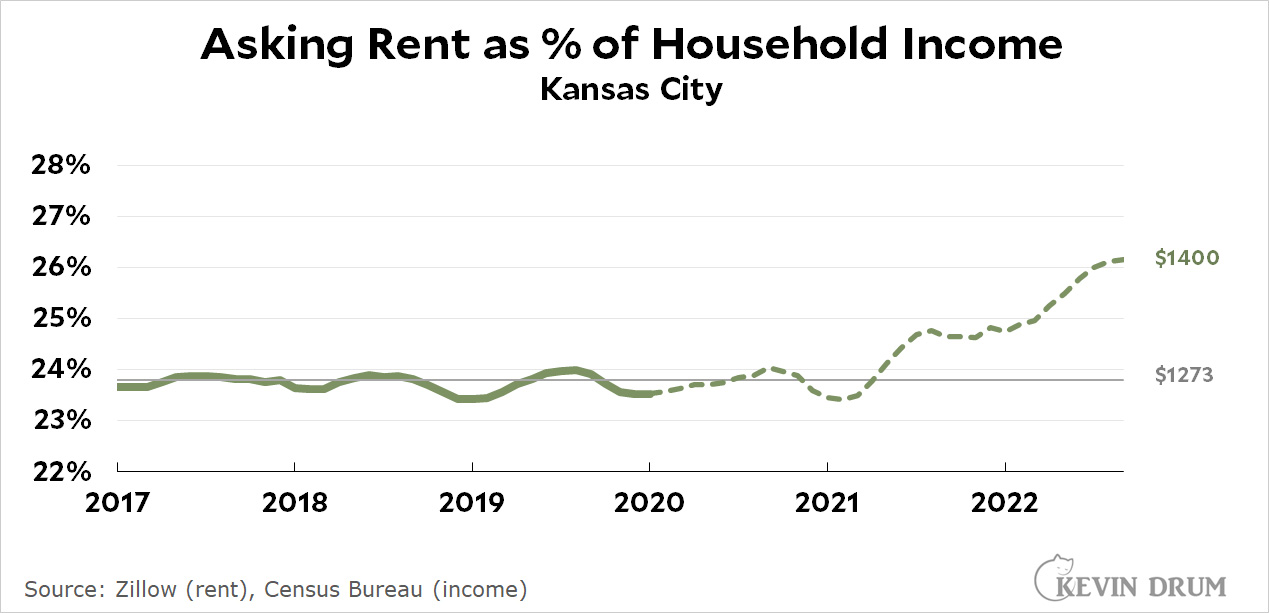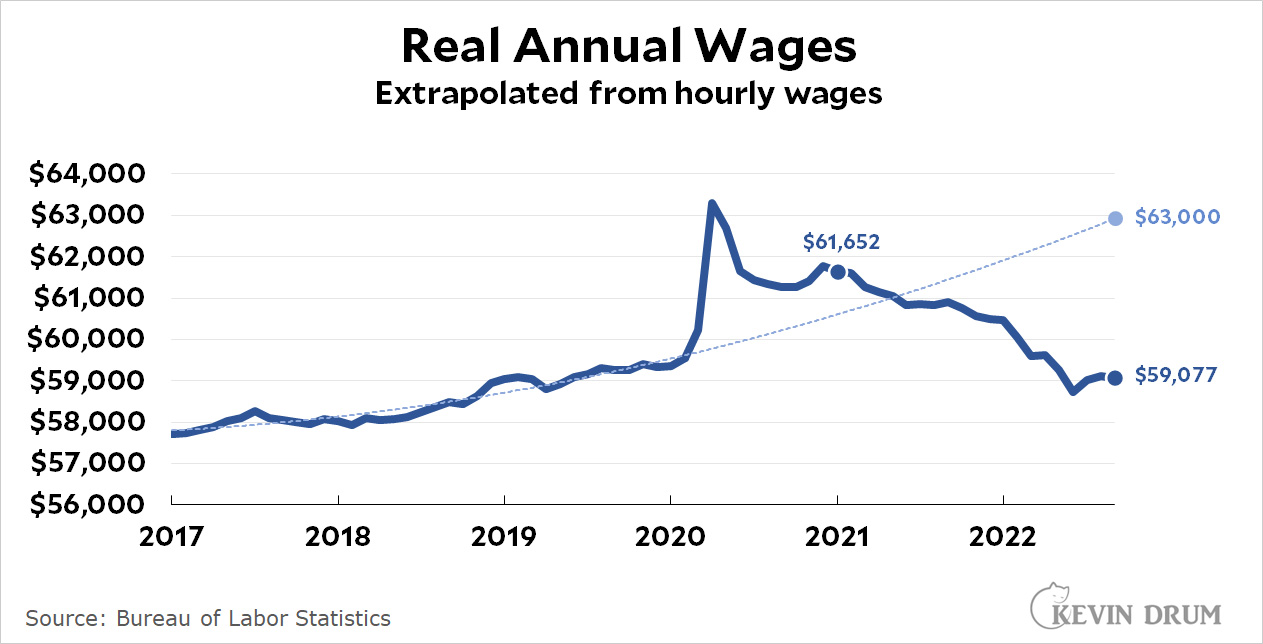The New York Times says that a rent revolution is coming, and not just to expensive coastal cities:
Kansas City, Mo., is a leading example. With a population of 500,000, where the avenues are lined with brick buildings and side streets have modest homes with raised porches, the city offers little to suggest a renters’ revolution. Zillow’s home value index puts the typical Kansas City home at $230,000, or more than $100,000 below the national level.
But with a steadily expanding economy driven by the logistics and medical industries, Kansas City has seen its rents increase 8.5 percent from a year ago....The strain from rising rents, which landlords say they need to cover their costs, is creeping from people working in low-income service professions to middle-income teachers and city workers, part of a festering affordable housing crunch that spreads more widely across the nation each month.
Because I'm a dork, the first thing I wondered was just how much rents really have gone up in Kansas City. The usual way to measure this is as a percentage of income, since incomes go up over time too. Here's the rent/income ratio for Kansas City:
 The solid green line shows median rent in Kansas City—measured by the Zillow ZORI index—as a percentage of the median household income in Kansas City reported by the Census Bureau. The dashed line is an extrapolation based on the growth of national household income.
The solid green line shows median rent in Kansas City—measured by the Zillow ZORI index—as a percentage of the median household income in Kansas City reported by the Census Bureau. The dashed line is an extrapolation based on the growth of national household income.
So the answer is that rent has indeed gone up quite a bit recently in Kansas City. On a percentage basis, it's increased from 24% of income to 26% of income. On a dollar basis, it means that even after you account for rising wages, you'll pay about $100 more for an apartment today than you would a year ago.
But what caused this? Rent activists like to suggest it's because of building regulations or greedy landlords, but those aren't problems that have suddenly cropped up in the past year. All the way through 2021, rents were perfectly stable.
So what happened at the start of 2021? This is not really a hard question:
 After adjusting for inflation, annual income has dropped more than $2,500 since the start of 2021. If income had instead stayed steady, it would cut the increase in the rent/income ratio in half (i.e., it would have gone up only to 25% instead of 26%). If wages had grown at a normal rate (dashed trendline), the rent/income ratio would still be virtually flat.
After adjusting for inflation, annual income has dropped more than $2,500 since the start of 2021. If income had instead stayed steady, it would cut the increase in the rent/income ratio in half (i.e., it would have gone up only to 25% instead of 26%). If wages had grown at a normal rate (dashed trendline), the rent/income ratio would still be virtually flat.
I'm puzzled that so many people on the left refuse to really, completely internalize this. Oh, we have activists fighting for a $15 minimum wage and other similar things, but we don't have very much outrage over the simple fact that working and middle-class earnings just aren't increasing enough. Whether the problem du jour is the cost of food or rent or gasoline or anything else, the real underlying answer usually doesn't involve food or rent or gasoline. It's simpler: The rent is not too damn high. Incomes are too damn low.

Increases in minimum wage does tend to push up wages at the lower end of the spectrum, including lower middle class wages.
Otherwise, the best the Democrats could do is run on bringing back the refundable child tax credits put in place during the pandemic--which the GOP now rejects. That, and unionization.
golack's suggestions - yes!
Another problem is simply that, in addition to needing unions, many low-income jobs are also just regular P/T work, or worse -a newer type of "on-call." The latter practice should be banned. It isn't something that has affected me, but I learned of people who lived at some distance from jobs in groceries or fast-food operations, had young children, depended on public transportation - & were required to call in 2 hours before a "tentative" start time to learn if they were needed. Those people found it very difficult to arrange for child care & arrive on time - if they weren't fired, they often just quit cold.
Like being on call for jury duty every day, except it's your job.
Pingback: Prices too high? or incomes too low? | Later On
Sometimes 2 things are true at the same time.
Incomes should be higher. Rents should also be lower.
The trendline on the real income chart looks a bit.....skewed? The rate of increase appears to jump dramatically over the last 2 years.
There's a reason why some promote simple solutions to complex problems they don't understand, and others recognize the need for understanding, and that reason is paradoxically simple. It has very little to do with what a person knows, and everything to do with what a person cares about.
If a person cares about people that live in Kansas City, and they really want to do something that will make things better, then they'll want to understand so they can be sure that the actions they take really are making things better, and not making things worse. If the only thing they care about is that the news is making them feel bad, then they'll want to stop feeling bad, and they'll think of someone to blame. Problem solved.
I suspect that even among Democrats, decades of neo-liberal ideology embedded in most discussions of politics and economics have left their mark. Thus there's an instinctive belief that wages are best left to the market to sort out, as long as they don't rise too quickly, because that will cause inflation.
Though others have spoken out too, I'll go with this piece from Robert Reich:
https://www.theguardian.com/us-news/commentisfree/2022/oct/16/republican-talking-points-midterms-robert-reich
Here's the second falsehood:
"2. They claim that inflation is due to Biden’s spending, and wage increases
Baloney. The major cause of the current inflation is the global post-pandemic shortage of all sorts of things, coupled with Putin’s war in Ukraine and China’s lockdowns."
A criticism of neo-liberal ideology demands a criticism of neo-conservative ideology.
The Wikipedia article on Milton Friedman's book "Capitalism and Freedom" (1962) includes the following quote: “… direct and indirect government intervention … should be stopped wherever possible (because the) doctrine of ‘social responsibility’, that corporations should care about the community and not just profit, is highly subversive to the capitalist system and can only lead toward totalitarianism.”
So being good can only lead toward totalitarianism? And caring only about "me, myself, and I" is the true path to freedom? What a great excuse for being selfish! I'm so glad I've known better than that since kindergarten.
There's a lot I like about mainstream media, but they do have a tendency to get fixated on a particular narrative, and it then becomes extraordinarily difficult to shake them from it. "Quiet Quitting" is one of those, this is another.
Many economists are asking why there hasn't been a wage-price (inflation) spiral. And here, you're demanding the wages keep up with prices (inflation), even while you're critical of the Feds using the kludge of the central bank rate to slice inflation at the risk of recession.
These paradigms might be inescapable and we all end up playing our parts in the narrative, but to stand back and watch this unfold, it is admittedly a little entertaining.
The rent is indeed too damn high. Depends on where we’re talking about. The housing economists I’ve read on the issue suggest we essentially have TWO (location-dependent) housing crises in America: One characterized by excessive rents and insufficient supply. And the other characterized by insufficient income.
Because wage increases = inflation, which is still out of control as your own charts showed
"I'm puzzled that so many people on the left refuse to really, completely internalize this. Oh, we have activists fighting for a $15 minimum wage and other similar things, but we don't have very much outrage over the simple fact that working and middle-class earnings just aren't increasing enough."
Speak for yourself Kevin. As someone affected by this I have never not been on these topics. And I'll also say, anecdotal though it is, that the political communities I interact with online (self-sorted, yes) often discuss these topics. Maybe this is a case of the base knowing what the "elite" should be going 0on about more? I don't know, but my perception is this isn't an invisible topic.
Maybe promoting unions, moderately restrictive trade with non-developed nations, and lower immigration rates would help.